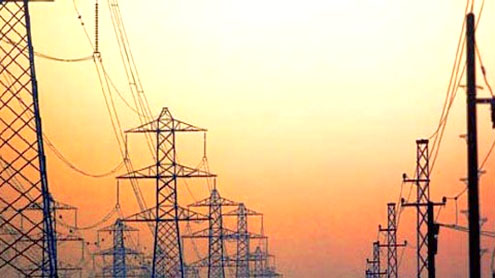 KARACHI: Either Karachi does not fall within the country’s borders or the Karachi Electric Supply Company (KESC) is out of control of the government, as despite the announcement of an end to power load shedding in the country by Tuesday, the city experienced the routine electricity outages ranging from three to five hours in the day.
KARACHI: Either Karachi does not fall within the country’s borders or the Karachi Electric Supply Company (KESC) is out of control of the government, as despite the announcement of an end to power load shedding in the country by Tuesday, the city experienced the routine electricity outages ranging from three to five hours in the day.
On Monday, responding to various questions of legislators in the National Assembly, Federal Water and Power Minister Syed Naveed Qamar had said that the country-wide electricity load shedding will come to an end Tuesday onwards.Although, following a drastic fall in temperatures, the cumulative power demand of the city reduced to around 1,800 megawatts (MW), reducing the power shortfall to only around 200MW, the city still went dark for three to five hours in various spells as the KESC opted to shut down its four power generating units.
Reliable sources in the KESC told Pakistan Today that only two of the six units of Bin Qasim Power Plant (BQPP) are functional apart from the two units of the newly-developed Bin Qasim plant having a power-generating capacity of only 115MW each.The power utility which persistently cries out for shortage of gas has switched off four power generating units of at least 180MW each at the BQPP while running the four units on gas. According to the sources, the KESC’s total power generation has reduced to only 1,200MW from the existing capacity of over 1,800MW.
“The power company’s own sources of electricity include the BQPP, Korangi Thermal Power Station, rental power plants, independent power producers, power generators at Korangi, Anud, Industries and the Karachi Nuclear Power Plant with the capacity to generate around 1,200MW, 200MW, 50MW, 250MW, 65MW, 14MW, 8MW and 80MW, respectively,” they said.
“The KESC’s total capacity for electricity generation comes to 1,864MW, easily meeting the present demand even without the huge power supply from Water and Power Development Authority (WAPDA).” With the WAPDA supplying an additional 650MW of electricity to the KESC, the power company’s total capacity jumps to around 2,500MW against the current maximum demand of 1,800MW in the metropolis.
The sources said that the Karachiites are facing “artificial load shedding” as the Abraj-led KESC management is not generating the power required from its own sources while depending on gas from the Sui Southern Gas Company (SSGC) and electricity supply from WAPDA.“The KESC lays the blame of load shedding on the shortage of gas supply from SSGC, but it can easily meet the city’s power demand by running some of its dual-fueled power generating units at their maximum capacity”, they added.Although the rest of the country is also reportedly yet to be exempted of power load shedding despite tall claims of the State Water and Power Minister, the overall power supply situation improved considerably after a reduction in demand due to the cold weather.
But the situation in Karachi showed no sign of relief, as the KESC is not in the mood to generate the power required.The sources, however, claimed that the power supply position in Karachi was comparatively better despite the gas supply from SSGC to KESC reducing to 120mmcfd. “Karachi may also be exempted from electricity shutdowns if the gas supply improves as per KESC’s demands,” they added.The sources further claimed that some of the units of BQPP are being run on furnace oil to minimise the energy woes in the metropolis.












